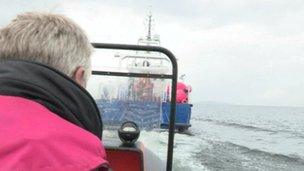On patrol with the Irish Sea EU fishing quota enforcers
- Published
Fishermen have quotas but how can you be sure they are not exceeding their limits?
The answer is that Department of Agriculture staff police the Irish Sea, boarding fishing boats at will to inspect their catch.
The fisheries protection vessel named Banrion Uladh, or Queen of Ulster, patrols as far south as Anglesey and as far north as Lough Foyle.
The crew of four can board and search fishing boats at will to ensure the fishermen are complying with rules and regulations on quotas.
Random
On the day I spent at sea on board the boat, the crew spot a trawler on the radar in the North Channel.
They decide to carry out a random inspection.
"This is the sort of thing we do. We might do eight or ten inspections every day" says Deputy Chief Fishery Officer Greg Griffiths.
"We'll inspect documentation, see what it's fishing for and look at the catch, if there is any on board.
"We'll make sure the catch matches what is on the log sheet and that there are no juvenile fish on board.
"We will also check fishing gear and measure the mesh size of the net."
The Banrion Uladh will take 15 minutes to travel the five and a half miles to get out to the Kilkeel-based trawler that is fishing for herring.
Greg Griffiths and two of his colleagues get kitted out to go on board the fishing boat.
'Frustrated'
He says that generally the reaction to the searches is not too bad.
"It all depends on what we find," he says.

The crew sailed out on a rib boat to reach the trawler and carry out their inspection
"Fishermen get very frustrated at the volume of regulations that govern their activity.
"They just want to get on and fish, basically.
"We also want them to fish and to be successful but in a sustainable way."
Mr Griffiths and two of his crew launch a rib to get across to the Kilkeel trawler.
The master of the Banrion Uladh, David Eccles, will stay behind and keep in contact with his colleagues by radio.
About an hour later, the boarding party returns. All is in order on the trawler and it's good to go.
There are occasions, however, when rules are broken and action must be taken.
"We have got extensive powers of search and detention" explains Mr Griffiths.
"We can search any vessel or any premises.
"We can instruct the skipper to do whatever we need done to facilitate an investigation - that can mean seizure of catch and fishing gear."
- Published28 May 2012
- Published17 December 2011
- Published15 December 2011
- Published22 August 2011
- Published6 February 2013